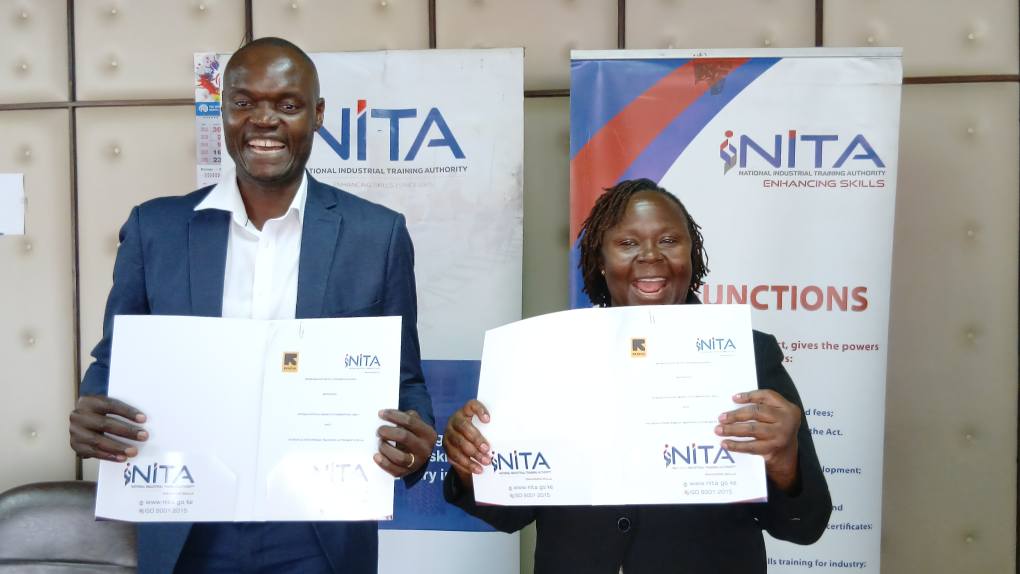
 International Rescue Committee (IRC) Technical Lead Boniface Odhiambo (L) with National Industrial Training Authority (NITA) acting director Theresa Wasike display the MoU is on the Integrated Early childhood Development and Education, skills, training program after signing it at the latter's office in NITA headquarters, Nairobi on September 10, 2025.
International Rescue Committee (IRC) Technical Lead Boniface Odhiambo (L) with National Industrial Training Authority (NITA) acting director Theresa Wasike display the MoU is on the Integrated Early childhood Development and Education, skills, training program after signing it at the latter's office in NITA headquarters, Nairobi on September 10, 2025.More than 10,000 refugees are set to benefit from a new partnership between the National Industrial Training Authority (NITA) and the International Rescue Committee (IRC).
The two organisations on Wednesday signed a Memorandum of Understanding (MoU) to roll out an Integrated Early Childhood Development and Education Skills Training Programme targeting refugees in Kakuma and Dadaab camps, as well as neighbouring host communities.
NITA Acting Director General Theresa Wasike said the programme is designed to strengthen employability, open up job opportunities, and empower communities.
“NITA’s role in this partnership is curriculum development. We are coming up with a curriculum on Early Childhood Development in Education, Skills Training Programme,” Wasike said during a joint press briefing at NITA headquarters in Nairobi.
Under the two-year agreement, NITA will also accredit training institutions, oversee the quality of instruction, and certify graduates so they are recognised nationally and beyond.
As of March 2025, Dadaab refugee camp hosts about 428,016 refugees, while Kakuma and Kalobeyei settlement hold approximately 303,247.
Wasike said the programme would ensure training meets standards that allow beneficiaries to access labor markets both locally and abroad.
She also linked the initiative to the Recognition of Prior Learning (RPL) policy launched by President William Ruto’s administration in March 2024.
“When we launched the policy on the RPL, both the refugee communities and Kenyans in general have been interested. We have realised that there are many Kenyans who have skills that they acquired but have not been able to have them certified,” she said.
According to Wasike, lack of certification has prevented many people from using their skills to improve livelihoods or secure jobs. To address this, NITA has been moving across counties to certify such individuals.
“We are ready to certify you. Our teams are in Mombasa, Makueni, Garissa, Kakamega, and Uasin Gishu counties. This is the first team under the Nyota program where we are expecting to certify about 8,500 people,” she said.
The Nyota programme targets more than 820,000 vulnerable and unemployed youth, including persons with disabilities, by enhancing employability, skills recognition, and access to decent work.
To make certification more affordable, the government has reduced RPL fees from Sh20,000 to Sh5,000.
International Rescue Committee Technical Lead Boniface Odhiambo said IRC’s role will be to support the training and link beneficiaries to employment opportunities, especially in the caregiving sector.
“Today, we are gathered here to sign a MoU with NITA as IRC, which defines framework of our collaboration on how we can support refugees and Kenyans to get skills and be certified more importantly in the caregiving sector,” Odhiambo said.
He noted that while the care economy is thriving, it has lacked proper structures. “NITA has wonderful curriculum that informs how the sector is going to train young people on how to become better caregivers and be able to earn a living out of that,” he said.
Odhiambo added that piloting the caregiving curriculum would help produce professional caregivers capable of working within Kenya and abroad.
He further welcomed the RPL initiative, saying it offers refugees long denied recognition for their skills a chance to participate in the job market.
“Refugees come into the country and given that they come in unprepared state, where probably they don’t have certificates, they can’t prove their professional qualifications. RPL enables them have them recognized through certification,” he said.
IRC said it looks forward to taking the programme directly to refugee communities to ensure they benefit fully from the certification process.












